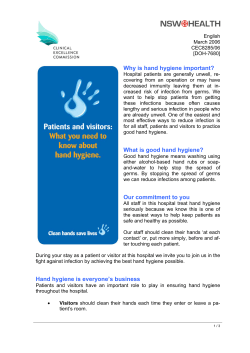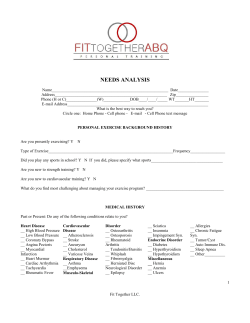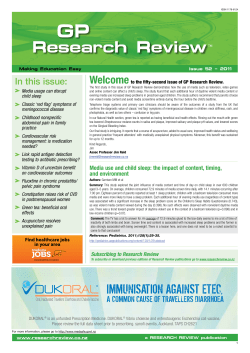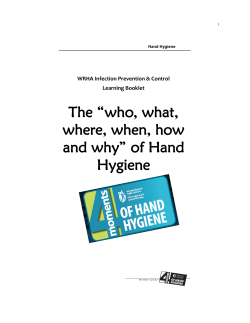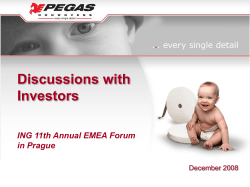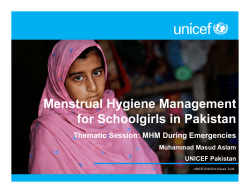
SocSocMed News Society for Social Medicine Newsletter Vol. 1 Issue 2.
SocSocMed News Society for Social Medicine Newsletter Vol. 1 Issue 2. FROM THE CHAIR Inside This Issue Causalities and Cuts FROM THE CHAIR 1 IN THE NEWS 2 SOCIAL MEDICINE IN ACTION 3 RESEARCH NEWS 4 DATES FOR THE DIARY 5 FUNDING NEWS EARLY CAREER RESEARCHERS 6 SSM COMMITTEE NEWS 7 BOOKENDS 8 HOUSEKEEPING EDITORIAL NOTE Aug 2010 We are members of the Society for Social Medicine. The inclusion of the word “social” indicates a commitment by our founders to identify collective responses to the problems then besetting society at large. Over the years, work presented at our scientific meetings has underpinned the progressive development of the modern welfare state. It has drawn attention to the deep inequalities, whether socio-economic, ethnic, gendered or otherwise, that exist in our country. It has identified the causes, and the causes of the causes, of the conditions that have prevented too many of our fellow citizens from living long enough to enjoy retirement. And it has identified, implemented, and evaluated responses that can address these problems. In many cases, these responses have involved actions by government. Governments, whether in Westminster, Edinburgh, Cardiff, Belfast, or in town halls throughout the country, have implemented collective actions informed by the research of our members, so contributing to healthier and more inclusive communities. Yet this is now at risk. The new coalition at Westminster is proposing deep and savage cuts as a means of realising its vision of a minimalist state in which each individual takes responsibility for themselves. As economists such as Paul Krugman and David Blanchflower have noted, there is no economic justification for cuts of this magnitude, with Krugman explaining why those advocating such policies are “heartless, clueless, or confused”. Even the IMF and OECD, once deficit hawks, now agree with them, having seen the experience of Ireland which has pursued such policies and, as a consequence, shut off any prospect of growth. Of course it is still far from certain whether cuts on the scale envisaged can be implemented without the breakdown of many of the functions deemed essential to run a modern state (exemplified by a recent leaked document from the Crown Prosecution Service which spells out, in stark terms, the consequences of even a 25% cut). Yet, it is already clear that the consequences for many of the most vulnerable in society will be severe. In such circumstances, our members have an important role to play. This is not a political society, but we have long acted as witnesses of the consequences of policies of governments of different complexions. It is we who have the ability to make the invisible visible. Unlike a terrorist outrage, the casualties of mistaken economic and social policies can far too easily go unnoticed unless someone makes the effort to report them. Members of this society can use their diverse disciplinary backgrounds to enumerate and to tell the stories of those who will be affected in the coming years. It will not be easy, as funding for research becomes scarce and essential infrastructure is dismantled, exemplified by the remarkable proposal to abandon the census. Many of our members in universities or in the soon to be dismantled NHS must fear for their own jobs. But, to recall the words of Primo Levi [albeit in different circumstances], “if not us who, and if not now when?” Martin McKee Chair, Society for Social Medicine 1 SocSocMed News IN THE NEWS Brush off a Heart Attack Dr Cesar de Oliveria explains how his collaboration with Professor Richard Watt and Dr Mark Hamer made big news in the BMJ recently. There has been an increasing interest in the possible link between periodontal disease and cardiovascular disease. Low grade systemic inflammation is thought to play an important role in the pathogenesis of atherosclerosis. Past studies show that markers of low grade inflammation are associated with greater risk of cardiovascular diseases. Consequently, contributing factors associated with inflammation and chronic infections, including oral infections such as periodontal disease, have been investigated to understand the relationship between dental diseases and cardiovascular diseases. The aims of our study were to investigate if poor oral hygiene indicated by less frequent toothbrushing was associated with risk of cardiovascular disease events in a sample of adults from the Scottish Health Survey. In addition, we sought the association between less frequent toothbrushing and inflammatory markers (Creactive protein and fibrinogen). In our BMJ paper, the study population consisted of 11,869 men and women aged 35 years and older who took part in the Scottish Health Survey, a cross-sectional survey that draws a nationally representative sample of the general population living in Scottish households. The surveys were linked prospectively to a patientbased database of clinical hospital admissions and deaths with follow up until December 2007. Cox proportional hazards models were used to estimate the risk of cardiovascular disease events or death due to oral hygiene. The association between oral hygiene and inflammatory markers was examined in a sub-sample of participants using general linear models with adjustments. There were a total of 555 cardiovascular disease events over an average of eight years of follow up, of which 170 were fatal. Approximately 74% of cardiovascular disease events had a principle diagnosis of coronary heart disease. Participants who reported poor oral hygiene (never/rarely brushed their teeth) had an increased (70%) risk of a cardiovascular disease event. Also, people with poor oral hygiene had increased concentrations of both C-reactive protein and fibrinogen, thus confirming and further strengthening the suggested association between oral hygiene and the risk of cardiovascular disease. Future experimental studies will be needed to validate a causal pathway from oral hygiene to cardiovascular disease via chronic inflammation. Our findings indicate that a self-reported single item measure of toothbrushing can be a useful and cost effective marker of future health risk in large scale population studies. Given the high prevalence of oral infection in the Scottish population, our findings alert doctors to be aware of an increased inflammatory burden, possibly from the oral source. Also, it has been suggested that eliminating active infection from the oral cavity before surgical procedures may help prevent postoperative infection. Doctors should educate patients about improving personal oral hygiene. Since smoking is the key shared risk factor in cardiovascular disease and gum disease, doctors also should encourage and support patients to stop smoking in order to benefit their oral health and cardiovascular health. For more information, check out the original paper: de Oliveira C., Watt R., Hammer M. Toothbrushing, inflammation, and risk of cardiovascular disease: results from Scottish Health Survey, BMJ 2010;340:c2451 2 SocSocMed News SOCIAL MEDICINE IN ACTION Maternity Worldwide Sophie Coronini-Cronberg, Specialist Registrar in Public Health, London Deanery, talks about applied work done in reducing maternal mortality in Africa. In Africa, 1 in 16 women die in pregnancy or childbirth, this is compared to 1 in 4,600 in the UK . In parts of Ethiopia it is as high as 1 in 7. Women die from bleeding, infection, fitting and obstructed labour. Most of these deaths could be avoided by simple and cheap measures. Death in pregnancy and childbirth does not just affect the woman: dependent infants and children may die soon after the death of their mothers. Although I’m a strong believer in charity starting at home – maternal deaths happen on our doorstep I’ve worked in Kenya and have seen first hand some of the devastating impacts of poor access to maternal health services. In Kenya, it was particularly the pastoralist Turkana community that was mostly affected (though Somali immigrants in the ultra conservative Wajir region are also hugely affected). Girls marry young, have many pregnancies, contraception isn’t really practised and all of this comes on top of existing anaemia, high parasitic and disease load. When I heard about ‘Maternity Worldwide’, I immediately wanted to be involved. Firstly, the founders – Dr Shane Duffy and Dr Adrian Brown – were extremely passionate and committed to reducing maternal morality and secondly, the charity has extremely low overheads with the vast majority of the money going straight into the projects. Most importantly, the work is not just based on ‘doing good’ for the sake of it. The model of care is well thought out and is evidence based. There is a two-way process with ‘Western’ healthcare professionals learning from their experiences. Teams of volunteer medical staff regularly take part in field operations e.g. fistula repair camps in a range of countries including Nigeria and Uganda . In addition to providing much-needed medical help to women, the experience is valuable to the volunteers who often see medical complications that are only rare in the UK . This helps maintain their skills in these areas, as well as learning to work in resource poor settings. For example, Leonie Penna a UK obstetrician who volunteered with MW for 3.5 months at the beginning of 2010 wrote: “[One] of the things I have learned is that you can manage obstetric problems effectively with a lot less resources than I would ever have believed possible. We only have a choice of five antibiotics here, compared to dozens in the UK”. The Big Lottery Fund recently supported a two year integrated programme aimed at empowering communities and improving access to quality maternal care in Gimbe Region , Ethiopia . An independent evaluation showed that the programme made improvements in the following areas: Women Groups Women’s status and financial security and promote women’s rights through a network of income generating groups. In 2 years, 1200 women took part in income generating activities. In this timescale, 90% of women had made profits and many now had savings. Community education Over a 2 year period the target was to reach 40 kebeles (villages) with community health education and have 10,000 beneficiaries of the sessions. 40 Kebeles and 110,000 community members reached Providing and equipping obstetric care facilities Between 2006 and 2008, the number of women attending Gimbie Adventist Hospital (GAH) and the clinics for deliveries increased by 51%. Over 3 years the case fatality rate fell dramatically from 6.2% to 0.6%. GAH has become the main provider of comprehensive obstetric care in the zone. Providing professional training & recruitment 20 nurses were recruited/trained in the period, along with all 11 practical workers. In addition doctors also completed the competence based knowledge and skills programme. 3 SocSocMed News (From previous page) Maternity Worldwide also undertakes primary research. For example, Prof. Andy Shennan’s work on Blood Pressure (BP) Device Trials, a pilot project in Gimbie region, Ethiopia. This evaluates low resource blood pressure devices in this setting. We have validated a suitable low cost device for use in the environment (accurate, robust, minimal maintenance, manual inflation pump, can be used by non-trained personal). Raised BP is a major risk factor in pregnancy for pre-eclampsia, a largely asymptomatic disease causing serious morbidity and mortality to both mother and baby, yet easily treated in this environment e.g. by delivery of the baby. It is unheralded, and we have determined that untrained personnel based in the community can use such devices. We propose a larger study to investigate whether training and introduction of such devices in large areas previously without any form of BP screening will result in referral and interventions to prevent serious disease to mother and baby. Since I first applied research from social medicine this was many years ago looking at access to healthcare services by the urban poor through Thailand ’s then existent universal healthcare policy (http:// www.equityhealthj.com/content/6/1/11) – I have found that at every level, my understanding is challenged. This includes questioning what the concept ‘urban poor’ means (or the spectrum of what it covers), wellmeaning initiatives (e.g. UC having the potential to widen health inequalities) and discovering inherent structural problems. At its most basic level, it’s taught me to reflect much more on possible impacts of policies and initiatives – and also sometimes to realise that “all the glitters is not gold”. Twitter accounts have now been created for each BMJ Journal. For more information and a basic introduction to Twitter, please see the latest post of the BMJ Journals W eb Development Blog: http://blogs.bmj.com/bmj-journals-developmentblog/ RESEARCH NEWS Concepts of Epidemiology Barbara Badger reports on the successful Crash Course in Concepts of Epidemiology that is running for the 6th year at University of Edinburgh. Since Professor Raj Bhopal first presented his crash course in Concepts of Epidemiology 5 years ago, praises such as ‘a unique experience’ and ‘exceeded my already high expectations’ are commonplace. Based on his award winning book "Concepts of Epidemiology", the course runs for 5 days in December every year. It has remained basically the same since 2005, covering most of the material in the book through lectures, small group exercises and test papers followed by group discussion, bringing participants to the level of introductory epidemiology in Masters level courses in Public Health, but it has been amended each year in response to delegate feedback (which has been consistently outstanding). Epidemiology is the scientific and applied discipline that seeks the causes of disease as they impact on populations. As such it is one of the fundamental disciplines underpinning both public health and clinical research and practice. The central concepts, strategies and methods of epidemiology are covered in this crash course in sufficient depth for participants to read epidemiology thoughtfully and to apply the concepts in their practice and research. The course is intended for those who want to lay a sound foundation to their knowledge of epidemiology, particularly as it relates to public health practice, policy and research, and is therefore suitable for those in the health professions (e.g. doctors, nurses, health promoters, health policy makers, health researchers) as well as social science, statistics and health management professionals. It could also be a useful refresher or additional course for those already trained in public health or epidemiology. However, those who have completed Masters level education in Public Health in the past 5 years may find it too basic. The course has been awarded 30 CPD credits by the Royal College of Physicians and the course fee - £795.00 – still held at 2008 rates, includes a copy of “Concepts of Epidemiology”, course materials, refreshments and lunch each day, and the course dinner. 4 SocSocMed News (From previous page) Members of the Society for Social Medicine are eligible for a 10% reduction and, thanks to the generosity of NHS Health Scotland which has sponsored bursaries since 2008, further financial support is also available for Scotland-based delegates who are otherwise unable to fund their places. Please note that the deadline for receipt of bursary applications is 31st August 2010. The course is proving increasingly popular, with many of the delegates signing up as a result of 'word of mouth' recommendation. There was a waiting list in 2009, and registrations for 2010 are already ahead of previous years, so early booking is advised to avoid disappointment. Full details of the course, including information about the tutors, feedback from previous courses, and how to apply for an NHS Health Scotland bursary, can be found at www.lifelong.ed.ac.uk/ medicine. REGISTER NOW FOR THE ERASMUS SUMMER PROGRAMME 2010! Each year, the Erasmus Summer Programme provides international students and academic health professionals with an invaluable opportunity to spend three weeks in Holland, bringing themselves right up to date in the health sciences. In just three weeks, the Erasmus Summer Programme provides 27 courses and 4 lectures on cuttingedge biomedical topics. Each course is designed to fully satisfy the needs of students and health professionals with a specific interest such as clinical medicine, general practice, public health, epidemiology, genetics or biostatistics. For more information and your online registration, please visit the conference website at www.erasmussummerprogramme.nl . FUNDING NEWS DATES FOR THE DIARY RANDOMISED CONTROLLED TRIALS IN THE SOCIAL SCIENCES: METHODOLOGICAL ADVANCES IN EXPERIMENTAL RESEARCH. FIFTH ANNUAL CONFERENCE, UNIVERSITY OF YORK 20 September, 9:00am Berrick Saul Building Key note speaker: Professor Don Green, Yale University The Management Board of the Actuarial Profession wishes to commission research in the area of modelling and understanding heterogeneity in mortality and morbidity risk which has an impact in areas of actuarial interest. The focus of the call will be on pump-priming interdisciplinary university-based research in the area of mortality/ longevity/morbidity with a clear line to how the results will be fed back to the Profession and/or lead to groundbreaking research. Further details including the application process can be found at: http://www.actuaries.org.uk/call_research_mortality Please contact: RCTs-conference@events.york.ac.uk or ring 01904 321726 for further information. For registration form: http://www.york.ac.uk/media/healthsciences/ documents/research/rctconfsept2010.pdf The closing date for applications is 5.00 pm BST on 31August 2010. For further information, please contact Ruth Loseby at :ruth.loseby@actuaries.org.uk. To get your SSMM 10% discount, make sure you state that you are a SSM member on the registration form. 5 SocSocMed News EARLY CAREER RESERACHERS Tips from the Top Mark Kelly and the ECR sub-committee met with Mark Petticrew, Professor of Public Health Evaluation, London School of Social Hygiene and Tropical Medicine to get some insight into how to become a successful researcher. and why? Hmmm...sort of a leading question, which assumes that all publications a source of secret pride, to some extent. I’m not sure pride is the relevant emotion, but I was pleased when this one was accepted [2] because it was the first comprehensive, unbiased review of this literature. What is the publication that you are least proud of and why? Why did you decide to get involved in social medicine? None, really, they are all written to serve some purpose or other. I didn’t deliberately decide to get involved in social medicine; instead, while I was doing my Ph.D. I became interested in epidemiology and in methodological issues more generally. When evidence-based medicine took off in the early 1990’s I then became very interested in how evidence-based approaches might be extended beyond clinical decision-making. If you had to recommend one book (preferably a popular science book, but could also be a text book) for an early stage researcher in social medicine to read what would it be? What three pieces of advice would you give to an early stage researcher looking to have a career in social medicine? (i) Don’t lose touch with your core discipline. (ii) Don’t get too hung up on particular methodological approaches – public health needs multi-method researchers. (iii) Go to the annual Society for Social Medicine conference, if finances permit – it gives a good a good overview of how researchers use different methods to approach similar questions What area of social medicine do you think most needs to be researched in the next 20 years? Quite possibly, the impacts on human health and society of climate change. It’s difficult to suggest one, because the popular science books, and textbooks that I tend to read have little to do with social medicine. However I often re-read Martin Gardner’s books and essays, because I like his sceptical approach, and eclecticism. And the odd facts. (For example, I’ve just opened one of his books and taking a page a random, I’ve read that “Mangani is the language spoken by the great apes that raised Tarzan”. It’s important to know these things). You can hear more from Mark Petticrew at the SSM Annual Scientific Meeting’s Cochrane lecture this September. In addition to the usual scientific and social programme, the ECR sub-committee will also be holding a couple of activities geared towards ECRs. We hope to be in touch with anyone registering as an ECR with further details soon! In the meantime, please visit our new webpage at www.socsocmed.org.uk/ECR/ECR%20Home.htm What was your first ever publication about, in 30 words or less? References: The first “proper” publication post-PhD one that I was a co-author on examined the reliability of the postal questionnaires in assessing health status by comparing questionnaire and interview responses, in prostatectomy patients [1]. This found among other things that questionnaires provide a more optimistic account of a patient’s state of health than do interviews. What is the publication that you are most proud of 1. Doll HA, McPherson K, Davies J, Flood A, Petticrew M, Ginzler M, Black N. B. Reliability of questionnaire responses as compared with interview in the elderly: views of the outcome of transurethral resection of the prostate. Soc Sci Med 1991; 33:1303-1308. 2. Adverse life-events and risk of breast cancer: A metaanalysis Petticrew M. Fraser J, M.; Regan MF. Br J Health Psychology 1999 4(1) 1-17. 6 SocSocMed News COMMITTEE NEWS Update from the Honorary Secretary Annual General Meeting Notice is hereby given to all members of the Society for Social Medicine that the 54th Annual General Meeting of the Society for Social Medicine will take place on Monday 6th September 2010 at 5.15pm at the Queen’s University Belfast. All members are invited to attend. ASSM Committee Membership Membership of the SSM Committee entails: Attending three meetings pa (one immediately prior to the Annual Scientific Meeting) Organising one one-day meeting during your three years on the committee Reviewing some of the abstracts submitted for the Annual Scientific Meeting (but not any from your institution). If you are considering standing for election to the SSM Committee but don’t know whom you know who is an SSM member who might propose you or second your nomination, please contact me via secretary.ssm@gmail.com, even if it is too late for this year’s elections. Call for Treasurer Aileen Clarke is planning to step down as treasurer of the Society in 2011. Invitations are now invited for nominations for this role. Being treasurer involves running the finances of the society and the membership database. Funding is available for one day a week of administrative support. Perks of the job include a supportive and fun committee meeting three times a year with friendly colleagues at the top of their field and free attendance at the ASM! For more details, contact aileen.clark@warwick.ac.uk 54th Annual Scientific Meeting; Queen’s University Belfast; 6- 8th September 2010 This year the annual scientific conference of the Society for Social Medicine will be held at Queen’s University Belfast, from Monday 6th to Wednesday 8th of September. The conference will include 90 oral presentations and 80 poster presentations on a wide variety of topics including unemployment and health, mental health, health policy and the provision of services, social inequalities in health, life course epidemiology, as well as diabetes, coronary heart disease and cancer. The conference provides an excellent opportunity to hear about the most recent research in public health and health services research, as well as networking with previous and potential colleagues. We look forward to welcoming you to Belfast in September. Places are strictly limited to 300 and registration fees increase from 1st August, so early booking is strongly advised. Delegates can register for the whole conference of for single days. A full programme can be found on the registration site. http://www.ssmconference.org.uk/ Guest speakers There will be two keynote lectures from distinguished academics – Professor Johann Mackenbach (Chair of the Department of Public Health at Erasmus University) will deliver the Pemberton Lecture, “Can we reduce health inequalities? Some lessons from the English strategy (1998-2010)”; while Professor Mark Petticrew of the London School of Hygiene and Tropical Medicine will give the Cochrane Lecture entitled “From evidence based medicine to evidence-based everything: the irresistible rise of the systematic review”. Workshops On the Tuesday afternoon there will be an opportunity to attend one of five workshops: Using natural experiments to evaluate population health interventions: new MRC guidance Policy models to quantify current and future chronic disease burdens: methods and applications. Using GPS & GIS for studies of outdoor environments and health and wellbeing Current and future research opportunities using online international survey databases. The NIHR Service Delivery and Organisation Programme: How to make a good application for funding; a learning workshop. 7 SocSocMed News (From previous page) Social events Alternatively delegates can participate in one of a number of organized social activities, including a tour of Belfast’s political and social murals. Poster guideline Please note that The poster board at the Belfast conference will be 1200mm x 1200mm. Contact point The conference website with details of the programme and how to register are available at http:// www.ssmconference.org.uk/ BOOKENDS As a member of the Society for Social Medicine you are entitled to an additional 5% discount on all Policy Press titles! Simply visit www.policypress.co.uk/promo.asp and enter the code POSSM10, your discount will be applied when you add books to your basket and you can then check out as normal. You will have to register the first time you buy books on their website, but they assure me this is very easy and takes less than a minute. If you have already set up an account, the website offers a facility to be reminded of your password if necessary. Their standard 20% online discount is a long-term offer so will not expire in the foreseeable future, giving SSM members a 25% discount. Public health and epidemiology books are available to browse at www.policypress.co.uk/ browse_health.asp? HOUSEKEEPING PLEASE keep your contact details up-to-date. Following-up bounced back emails takes a lot of time, so please let us know as soon as you change any part of your contact information - work address, home address, but most importantly *email address*. The easiest way of doing this is to go to SSM website and click on Membership and then Online update . AND ANOTHER THING.. To help plan your accommodation for the 2012 ASM taking place in London at LSTHM (London School of Hygiene and Tropical Medicine) from Wednesday 12 Sept-Friday 14 Sept 2012, please fill in our quick online questionnaire: http://www.surveymonkey.com/s/6G8TWPK Thank you! EDITORIAL NOTE Here we are squeezed into the back but we wanted the final word! We hope that you are all enjoying the summer and when ever and where ever you go on holidays, we wish you a very pleasant restful break. We look forward to hearing from you when you are back at work in the Autumn and please keep those interesting articles coming in. We love to hear all about the great pieces of social medicinal research that is being done across the world. All the best, Catherine & Noriko CALL FOR SUBMISSIONS SocSocMed News is a quarterly e-newsletter. The next issue dates are October 2010 and January 2011. We would love to hear from you about any work you or your colleagues are doing in social medicine. We are especially interested in articles on research methodologies, applications of social medical research and any topical research or media piece that would be of interest to members. Future editions may be themed but in the meantime, if you have any ideas or suggestions for contributions, please drop us an email with your suggestion to Dr Catherine Heffernan, hefferc@yahoo.com or to Dr Noriko Cable, n.cable@ucl.ac.uk. The deadline for submissions to the October edition is 15th September 2010. Please keep articles to 500 words. 8
© Copyright 2025






